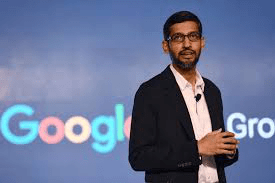Chief Executive Officer is referred to as CEO. The CEO, who is the highest-ranking executive in a business or organisation, is in charge of making crucial business decisions, overseeing all operations, and guiding the enterprise towards its aims and objectives. The CEO is often responsible for the company’s financial performance, strategic direction, and overall success and reports to the board of directors.



- Role of CEO
- Responsibilities of CEO
- Qualities of CEO
- Salary of CEO
- Life Style of CEO
- Director vs CEO
- CEO vs Managing Director
- Success Story of Mr. Sunder Pichai
Role of CEO
The highest-ranking executive in a corporation is the CEO, or Chief Executive Officer. Their contribution to the organization’s general administration, strategic direction, and leadership is vital. A CEO’s primary duties and responsibilities often include the following:
Leadership and Vision: The CEO is in charge of establishing the company’s long-term objectives, mission, and vision. They create and convey a clear direction for the company, encouraging and motivating everyone to work towards shared goals.
Development of Strategy: The CEO is essential in developing the company’s strategic plans. In order to discover opportunities and build strategies for achieving sustainable growth and competitive advantage, they evaluate market trends, competition, and internal capabilities.
Responsibilities of CEO
The duties of a CEO, or chief executive officer, might change based on the size, sector, and particulars of the organisation. However, some typical duties related to the position of a CEO include:
Strategic Leadership: CEOs are in charge of determining the organization’s overall strategic direction. They establish strategies to achieve the company’s vision, mission, and goals. They take important decisions that determine the future of the business and direct its expansion.
Making decisions: CEOs take important decisions on the company’s behalf. Before making crucial decisions about business operations, investments, partnerships, mergers and acquisitions, and resource allocation, they gather information, assess risks, and take into account the potential impact on diverse stakeholders.
Corporate governance: CEOs make sure the business complies with all applicable laws.
Qualities of CEO
The characteristics of a CEO (Chief Executive Officer) might change based on the industry, size, and organisational culture of the company. However, there are a few crucial traits that are typically valued as essential for a good CEO: A CEO should be able to inspire and lead personnel to realise the company’s future vision. This is known as visionary leadership. They should be able to build a convincing roadmap for the organisation and set strategic objectives. Strategic Thinking: To make important decisions that have an impact on the long-term success of the business, CEOs must possess good strategic thinking abilities. To remain competitive, they must be able to analyse market trends, spot opportunities and risks, and create winning plans. CEOs need to have strong business acumen.
Salary of CEO
A CEO’s (Chief Executive Officer) pay can vary widely depending on a number of variables, including the company’s size and kind, industry, location, and overall financial performance. The CEO’s reputation, negotiation abilities, and experience can all have an impact on their salary. Due to the size and complexity of these organisations, CEO pay are typically greater in major multinational firms or publicly traded companies. These CEOs might be paid a base salary in addition to a range of bonuses, stock options, and other incentives based on the success of the business. In such businesses, CEO remuneration packages can top millions or even tens of millions of dollars. It’s crucial to remember that CEO pay has generated discussion and
Lifestyle of CEO
Depending on the business, the sector, and the individual’s tastes, a CEO’s lifestyle might vary greatly. However, the following broad characteristics can help you get a sense of what a CEO’s lifestyle might entail: CEOs often maintain tight work hours. They frequently put in long hours and may need to be on call round-the-clock to manage work-related issues, make important choices, and respond to crises. The necessity to meet with clients, investors, or other stakeholders necessitates that CEOs frequently travel widely, particularly if the company has a global presence. Travel may involve domestic and international journeys, conference attendance, and visits to business locations or manufacturing plants. CEOs invest a lot of time on meetings and networking
Director vs. CEO
A director is a member of the board of directors, which is in charge of monitoring a company’s overall performance and direction. Typically, a company’s shareholders elect or appoint the directors. Their main responsibility is to make decisions that are consistent with the company’s strategic objectives and act in the company’s and its shareholders’ best interests. Directors take part in board meetings, contribute to conversations, offer direction, and decide on important issues impacting the organisation. To address particular facets of corporate governance, they could also participate in different board committees, such as audit or remuneration committees.
whereas, The CEO is a company’s top executive and is in charge of overall management and performance. The board of directors appoints the CEO, who answers to them.
Their primary responsibility is to create and carry out the organization’s strategic plans, establish its vision and goals, and make important decisions that will assure the success of the enterprise. The CEO directs the executive team, administers day-to-day business operations, and oversees the execution of objectives and policies. In front of external stakeholders like investors, clients, and the media, they serve as the company’s spokesperson. The CEO presents the company’s progress to the board of directors, asking for advice and getting consent for major decisions or investments.
CEO vs. Managing Director
Both “CEO” and “Managing Director” are titles given to top-level executives within a company, but how they are used and what they mean will depend on the organization’s structure and the particular company. These names may be used interchangeably in some situations, while they may denote various duties or responsibilities in others. It’s significant to highlight that because corporate structures might vary among nations and industries, there may not always be clear-cut definitions and distinctions.
The CEO, or chief executive officer, is typically regarded as the most senior executive in a corporation. They are in charge of the organization’s general management, performance, and strategic direction. The CEO is in charge of making important choices that have an impact on the company’s expansion, profitability, and long-term performance. Typically, the CEO is answerable to the board of directors or the company’s shareholders. They frequently act as the company’s public face and speak for it when interacting with stakeholders, shareholders, and the media.
whereas, Managing Director: In organisations, particularly in Europe and some other regions of the world, the term “Managing Director” is frequently used. In some circumstances, the terms “Managing Director” and “CEO” are interchangeable. However, there are times when the Managing Director may have a more specialised position. For instance, each division or business unit may have its own Managing Director who is responsible for supervising its operations and performance in organisations with complicated organisational structures or numerous divisions. The CEO or another senior executive is the one who these Managing Directors answer.
Success Story of Mr. Sunder Pichai



CEO of Google and Alphabet Inc.: Sundar Pichai took over for Larry Page as Google’s CEO in 2015. His extraordinary leadership and capacity to foster innovation led to his promotion. Pichai led Google through several difficulties, including the emergence of artificial intelligence and the dominance of mobile devices..
Alphabet Inc., the organisation that houses Google, underwent a restructuring process in 2019, and Pichai was appointed CEO of both Google and Alphabet as a result. This change gave him the opportunity to manage the more extensive operations of Alphabet’s divisions, such as Google, Waymo, and DeepMind. The company has continued to expand and succeed as a result of Pichai’s strategic vision and ability to carry it out.
Sustainability and Innovation Commitment: Sundar Pichai has emphasised the significance of innovation
FAQ's about CEO
Q: What are the qualifications to become a CEO?
A: Depending on the firm and the industry, different qualifications may be required to become a CEO. CEOs are typically required to possess a mix of education, experience, leadership abilities, and business savvy. A lot of CEOs have advanced degrees, such an MBA or other relevant credentials. Industry knowledge, a successful track record, and prior executive-level experience are frequently seen as crucial qualifications.
A CEO needs to have a variety of competencies, including:
Leadership: The capacity to steer a team towards a common goal and to take difficult decisions.
Strategic thinking: The ability to create and implement a long-term business strategy.
Effective communication skills are necessary to express concepts, a vision, and objectives to numerous stakeholders.
Making decisions: The capacity to choose wisely in light of information and analysis.
Financial savvy includes being able to successfully manage resources, create budgets, and comprehend financial statements.
Ability to lead and navigate amid shifting market conditions and business upheavals.
The ability to recognise and address complicated challenges that develop within a firm.
Empathy, self-awareness, and the capacity to forge lasting bonds are all characteristics of emotional intelligence.
A CEO’s impact on a company’s success and direction as the chief executive is significant. They are held accountable for the company’s performance even though they are not completely responsible for the result. The direction of the organisation is greatly influenced by the CEO’s leadership, decision-making, strategic vision, and capacity to carry out strategies. However, a company’s success or failure is also influenced by a number of outside variables, market conditions, and the combined efforts of the entire organisation.
Q: What subjects are covered in an LLB program?
A: LLB programs cover a wide range of subjects related to law and legal studies. Some common subjects include constitutional law, criminal law, contract law, administrative law, property law, international law, and legal research and writing.
Q: Can a CEO be fired?
A: The answer is that a CEO can be fired or demoted. A contract or agreement that specifies the terms of the CEO’s employment, including the grounds for termination, usually governs this position. The CEO can typically be hired and fired by the board of directors, who are chosen by shareholders. In rare circumstances, shareholders’ voting rights may also give them a role in whether the CEO is fired.
Q: Can a CEO be the founder of the company?
A CEO can be the company’s founder, yes. In fact, a lot of businesses are started by people who take on the position of CEO to steer and expand their fledgling businesses.






